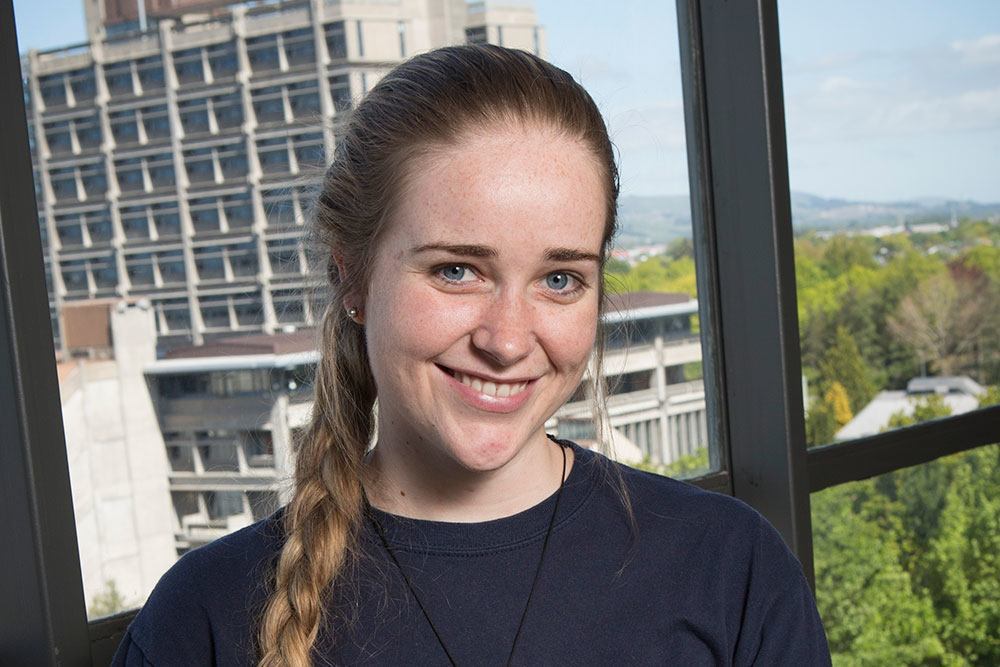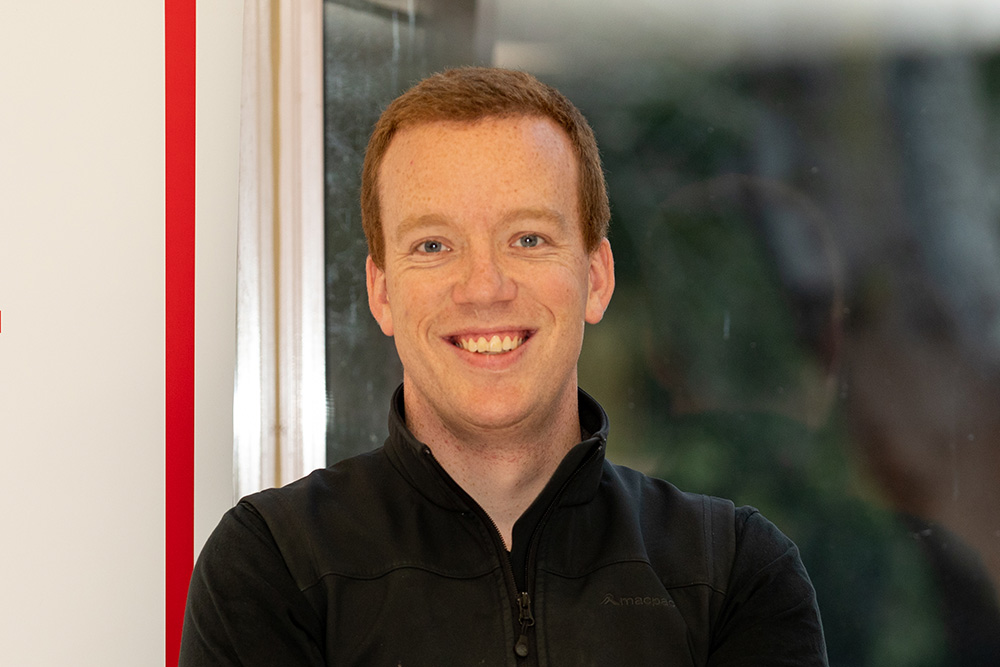Qualifications in our school
- Explore your degree options in Mathematics
- Explore your degree options in Statistics
- Explore your degree options in Financial Engineering
- Explore your degree options in Data Science
- See all School of Mathematics and Statistics courses
Scholarships and funding
- Explore the full UC Scholarships database
Course and study advice
- Need more information? Visit our Student Advice and Resources page.
Mathematicians and statisticians are developing new tools and techniques to deal with problems in areas from business management to biology, as well as considering new insights in the more traditional areas of physical science and engineering - meaning the versatility and marketability of these skills increases every year.
Why study Mathematics and Statistics?
Undergraduate and postgraduate students can specialise in Mathematics or Statistics, or combine them with other subjects. Some undergraduates choose to do a double degree in Mathematics and Statistics. Statistics and Mathematics are also vital components of Science, Engineering and Social Science degrees.
Popular specialisations include:
A degree in statistics will make you the person everyone wants to know!
Statisticians play a key role in making sense of complex data in all branches of science, and areas beyond, like finance and law. Their skills are highly sought by researchers, Government agencies and businesses, both here and overseas.
Statistics has been transformed over recent decades, due to rapid advances in computing technology, and new methods for analysing large amounts of data. By studying statistics, you will become highly skilled in using these methods, and able to interpret the results for a variety of clients. Statistics, like mathematics, is ranked as one of the top careers.
Combining statistics with other subject areas provides a powerful way to leverage your subject-specific expertise with quantitative and analytical skills. The advanced statistical skills you will learn can allow you to understand more about the data in your discipline than anyone else. This strength will stand out in your CV making it attractive to future employers.
- Find out more about studying Statistics at UC
- Explore the full list of courses offered in Statistics
Combine the best of both worlds, to provide even more flexibility in career opportunities open to you. The two subjects naturally complement each other. In statistics, you learn about getting useful information from data and presenting this information, as part of evidence-based decision making in an uncertain world. In mathematics, you learn about thinking logically and solving complex problems, both practical and in the abstract, which provides much of the underpinning of statistics. The combination provides you great flexibility in terms of how practical versus theoretical you want to be.
It is hard to find list of Top 100 "best" or "in-demand" jobs in the world, which do not include careers where the skills mathematicians or statisticians are needed. To name just a few on recent high profile lists: data scientist, actuary, market researcher, operations research analyst, epidemiologist and biostatistician.
- To undertake a BSc(Hons) in Mathematics and Statistics you need at least 105 points from 300-level MATH and STAT course. See all Mathematics courses. See all Statistics courses.
Big Data! Those two words describe one of the new hot topics in mathematical sciences. The Computational and Applied Mathematical Sciences degree programme will give you access to this, and other fast growing areas of computational mathematics and statistics.
The gap between the demand for graduates with computational mathematical science skills and the supply is predicted to increase, and there is no doubt that a graduate with good skills in this area will be in demand. This is an area of mathematical science that will open up a new world to you.
Required prerequisites
This major draws on courses which apply mathematics and computing. In addition to the required mathematics courses, a choice of papers in Management Science, Statistics or other subjects may be required.
The requirements at undergraduate level to allow progression to honours or masters are:
- 45 points from MATH201, 202, 203, 220, 240 and 270, including MATH201 and at least one of MATH202 or 203.
- 60 points from MATH301-394
- An additional 30 points from MATH301-394 and STAT301-394 or other approved courses.
- 45 points from other approved courses at the 200 level or above. These would normally come from CHEM, COSC, MATH, PHYS, STAT or Engineering courses.
Need more information?
- Find out more about the requirements for a BSc (Honours) degree in Computational and Applied Mathematical Sciences
- Find out more about the requirements for a Master in Science in Computational and Applied Mathematical Sciences
- Explore the full list of courses offered in Computational and Applied Mathematical Science
Data Science is one of the fastest growing areas in science. There is a worldwide skills shortage of talented people with data science skills so if you are thinking about life after UC this could be a good option for you. Data Science has been described as the bridge linking large data sets (often called Big Data) with computational capacity to provide solutions for business, industry, other areas of science, health, and many more. In this postgraduate Masters programme you will develop your understanding of what Data Science is, learn new skills, and develop your communication and ability to work in a team. Effective communication and team work are listed as key attributes for a Data Scientist.
- Find out more about undergraduate study options
- Find out more about the Postgraduate Diploma in Applied Data Science
- Find out more about the Master of Applied Data Science
Why is the Reserve Bank governor increasing the cash rate? How does the exchange rate hit your back pocket?
Mathematics and economics are a great combination for understanding how the world works. In economics you learn about how people and organisations behave and interact at global and micro levels, and how this impacts on our everyday lives. The mathematics provides the technical language on which economics theory is based, to enable you to leverage deeper insight in your analyses.
With this combination you will be opening up a broader set of career opportunities, you could even end up becoming the next governor of the Reserve Bank making those key decisions on behalf of the country.
A Bachelor of Engineering (Hons) degree requires the completion of core Mathematics courses.
- View the full list of Engineering Mathematics courses offered.
- Find out more about the structure of the BE(Hons) degree.
What caused the global financial crisis? Can you help prevent another one?
Combining mathematics or statistics with finance is an incredibly powerful way to leverage knowledge of quantitative finance with deep analytical skills.
You will be able to see connections and solve problems that nobody else can. And when the time comes to apply for jobs, your CV will stand out from the rest.
Financial engineering is a cross-disciplinary field combining financial theory, mathematics and computational tools to design and develop new financial or actuarial products, portfolios and markets. It also has an important role to play in the financial industry's regulatory framework. Financial engineers manage financial risk, identify market opportunities, design and value financial or actuarial (insurance) products, and optimise investment strategies. To carry out these tasks, financial engineers develop mathematical and statistical models, and the computational tools to implement them.
BSc in Financial Engineering
UC is the first university in New Zealand to offer degrees in Financial Engineering. A three-year undergraduate BSc in Financial Engineering covers the core technical skills in financial and economic theory, mathematics and statistics, and computer science. 16 courses are prescribed to provide the depth and breadth of knowledge required of all Financial Engineers. The remaining 8 electives provide pathways to specialise in finance, mathematics and statistics, or computer science.
Honours and Masters in Financial Engineering
Our undergraduate programme provides students with employment opportunities at graduation, or allows them to advance to the one-year Honours degree at Canterbury, or to a Masters of Financial Engineering. Graduates with such cross-disciplinary knowledge and highly technical skills have a breadth of career opportunities such as investment, actuaries and statisticians/data scientists.
- Find out more about studying Financial Engineering at UC
- Find out more about the Masters in Financial Engineering
Training in this degree develops two of the most fundamental and widely applicable human intellectual capabilities. Not only will you gain the analytical skills of the mathematician, but you will develop your ability to argue cogently as a philosopher. In short: you will think critically, logically, and independently; and you will write, reason, and communicate clearly. These are the skills which underpin success in any profession. The programme also equips students for PhD programmes in Logic, Philosophy and Foundations of Mathematics.
Required prerequisites
Entry to the BSc(Hons) degree programme is at 300-level. Students typically have either 60 points in MATH and 45 points in PHIL, or 75+ opints in MATH and 30+ in PHIL at 300-level.
Need more information?
- Find out more about the Bachelor of Science (Honours) in Mathematics and Philosophy
- See all taught postgraduate courses in Mathematics
- See all taught postgraduate courses in Philosophy
The Physics and Astronomy and Mathematics and Statistics departments offer a joint BSc(Hons) programme for students who are interested in both subjects and do not wish to concentrate entirely on one at the expense of the other.
Entry requirements
You enter this programme at the 300-level where normally you take 60 points of MATH 300-level and 60 points of PHYS 300-level courses. This is again followed in the next year with a mixture of 400-level courses as well as a research project.
If you are interested in keeping this option open, it is important that you take the right Mathematics and Physics courses at the 200-level in preparation. Seek advice from our course coordinators.
The course coordinator for this programme is David Wiltshire in Physics. You can also contact Mark Hickman (Mathematics).
Mathematics and Statistics graduates are widely employed in industry, commerce, government departments and teaching, but job opportunities exist in many less obvious fields. Many jobs require specific mathematical or statistical skills while others require the ability to think precisely and reason logically - skills your mathematical studies will hone.
A broad background and interest in a variety of mathematical areas, computation and science will make you highly employable, so you should aim to take papers in subjects that will expand your knowledge of applications of Mathematics and Statistics - for instance in Accounting, Biology, Computer Science, Economics, Engineering, Management, and Physics. There are very good job opportunities in financial mathematics and in computing combined with Mathematics, and new opportunities emerging in the field of Data Science. The demand for Statisticians has also burgeoned in recent years.
- Explore UC's career-planning services
- Find out more about careers in Mathematics
- Find out more about careers in Statistics
- Find out more about careers in Data Science
- Find out more about careers in Financial Engineering









